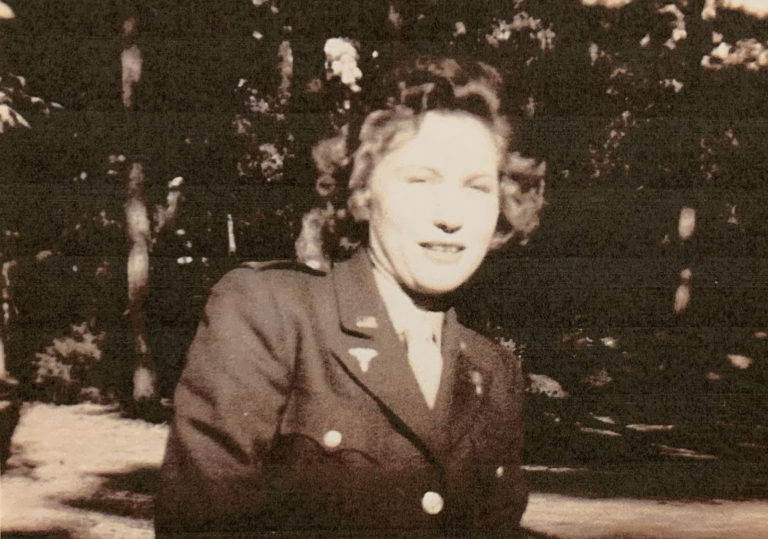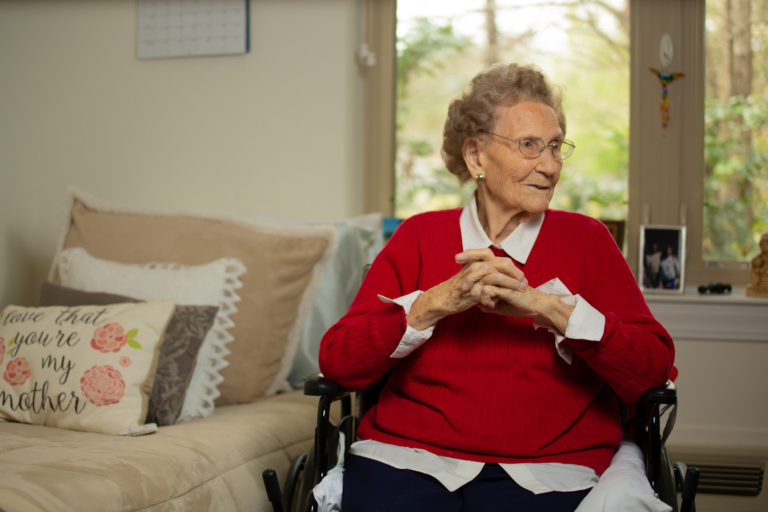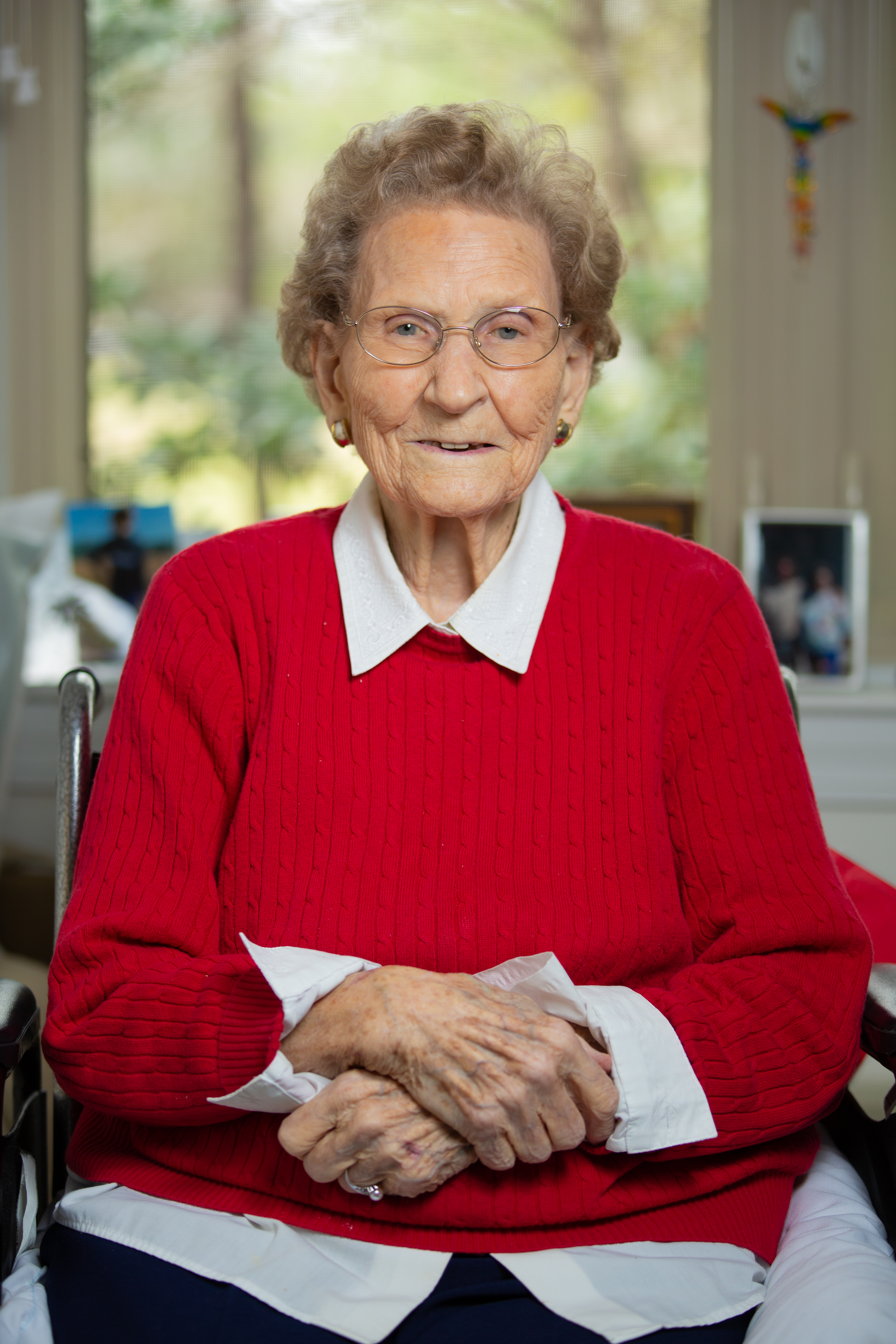Celebrate Our Veteran gives voice to the stories of the U.S. military veterans living amongst us. The actions of these brave and dedicated people, who have served our country both in active military duty as well as administrative positions, have and continue to contribute to the protection and preservation of us and our country.
We hope that this section of our paper is an opportunity for our community to hear and see veterans with new eyes, and for veterans to receive recognition and honor for their experiences and life journeys.
This month’s Celebrate Our Veteran recounts the story of Treva Green, as told in her own words.
by Melissa LaScaleia
“I was born January 23, 1921. I grew up in Forest City, North Carolina, between Charlotte and Asheville. I was active duty military from October 15, 1943, until December 8, 1945.
I think I got a star-bangled heart going to the movies one night and I thought, this is what I have to do. I talked it over with my family, but they didn’t think I’d do it till I actually did. I felt like it was my calling, and it was.
I joined what is today the Air Force with the intention of going into Air Evac. I had already gone to nursing school in Charlotte, North Carolina. They put me in surgery, and after a week, the director from Denver, Colorado began appointing surgical nurses overseas. I was sent to Camp Swift, Texas, for training when I was twenty years old, and then sent on a boat to England.
We landed in Fleetwood, England, later called the home of the Beatles. When our ship docked, it was pouring rain, and we had no supplies. So they brought us to the basement of an old theatre— everything was underground because of bomb threats. It was raining and cold, and I thought, ‘Why did I ever leave home?’ I was crying as I walked inside.
They fed us ham and potatoes. I remember the ham had pineapple slices on it, and the potatoes seemed like someone had dropped them on the floor.
Then an officer saw I was crying and came over to comfort me. He began to speak to me, and when he stood up, I noticed that he was a full colonel. I asked him where he was from, and he told me Charleston, South Carolina. I felt at home after that.
We were there for several weeks, then we crossed the English Channel. We went over to England on the Queen Elizabeth— that was the life. But we came back on a cattle boat. It made me think we didn’t do too good of a job.

The first night we were out on the sea, they told us to sleep in our life jackets. And I thought, ‘No, I’m not going to do that.’ I don’t like the water anyway. But they kept repeating it, ‘Be sure to wear your life jacket tonight.’ I finally put it on. The next morning they told us: ‘The reason why we asked you to sleep in your life jacket is because last night we were in a nest of enemy submarines.’ Not fish— submarines.
We landed at Le Havre, France. It was cold and rainy. And there we were assigned to the 121st Medical Evacuation Hospital. When we broke down our equipment and first went to work, I was in the operating room and I looked around and thought, ‘Oh my goodness, this is where the word MASH came from.’ We had four tables to operate on, and everybody was doing something on each table.
My patient was a burn victim. And we were trying to understand what country he was from. I suggested we bring a Russian lady over, to see if she could speak to him. When she came and asked him a question in Russian, he just jumped up and off the table like he was going to run somewhere. It scared him to death. We chased him around trying to catch him….But anyway, I know where the word MASH came from.
We were sent to every hospital that needed help. I had a Polish colonel, and Captain Rose was our commander. We traveled a good bit, going from one hospital to another, relieving nurses that had been sent back to hospitals for emergencies. At first, we saw very little in the way of American injuries.
This was before D-Day. From France we went to Germany, then to Czechoslovakia, then Linz, Austria.
When we got to Linz and entered the hospital, all the patients had thermometers in their mouths, and had already expired. We thought they died from hunger; they looked like skeletons. So we were sent to another location. At one point I looked out the window and thought I was looking at cordwood; but was told that they were actually skeletons that they had thrown out the window.
You had to stay busy, seeing all this— that’s what we did. But we didn’t ever get to go anywhere— our colonel was a stinker.
One night I served with a Russian doctor. And we were with a patient who had been shot in the tummy. And he kept repeating this one word in Russian, and the doctor replied. And I said to him, what did he say, and he said, ‘You treat me like cattle.’ So I said to the doctor, ‘What did you reply?’ He said, ‘I told him there wasn’t any difference.’
I kept my distance after that.
Another time there was an American who had been shot and we worked with him all night long, waiting for the plane to come and take him to the hospital where he could receive the care he needed to recover from a gunshot wound. The plane had just landed at 3am when he drew his last breath. That was horrifying.

We had a week of rest on the Rhine. I got to ride down the Blue Danube a little bit. And at one point, we were camping at a place beside a train loaded with supplies— there were these big cans on it in open view. There was a serviceman walking back and forth. And my roommate said to me, ‘When he walks down that end, I’m going to run up here, and get one of these cans, and see what he’s got. Then when he goes to the other end, I’ll entertain him, and you see what he has on the other side.’
So we crawled under that train; we each made a trip. Eating K-rations all the time made us desperate. We got those cans— but boy we had a time opening them. My roommate had a gallon can of sliced pineapple. And I had a gallon can of ketchup. Ketchup was rare, you couldn’t buy it in the states. And I thought, ‘I’m going to take this back home.’ I carried that thing around with me for one day. By nightfall, I had left it in the corner of the mess hall with a coat thrown over it.
We were with a great troop of boys. They mothered us and waited on us; they were just marvelous.
One day, the weather forecast predicted rain, so the boys decided to go out and pitch pup tents the afternoon before the showers. The next morning when the colonel came and saw they had already been erected, he was so mad, he made them take the tents down and move them again.
We turned old buildings into hospitals, everywhere we went. We went to Nuremberg, Germany. At one point, we were called to join Patton’s third army. We were assigned to him to accept casualties during the Battle of the Bulge, for two to three days.
I stayed in Europe until the end of the war— it was a bad two years and four months. Holidays were few and far between for us, but that’s what I looked forward to the most during my time there.
We had a colonel presiding over us who was really strict. The day we were leaving to come home, they sent our bedding roles ahead of us. He had hidden guns and other items in his bedding role. When they discovered it, they relieved him of his command.
When I came back home, I went to work for a doctor in my hometown. I still felt like I was in the service working for him. He was an old country doctor. I stayed there until I got married, and then my husband and I moved to Florence. My husband was in the automobile business, and he was sent to Conway to run a car dealership.
I joined the Conway hospital in March 1948, and worked in the operating room for 40 years. And I’ve lived in Conway ever since that time. Once I took a leave for eight years to work at the Myrtle Beach Air Force Base, then returned to the hospital.
I have two children. My son is 71 this year, and my daughter is 65. I’m a member of First Baptist Church in Conway, and have been since I moved here.”
Treva will be the grand marshal for the Veteran’s Day Parade this year in Myrtle Beach.




























